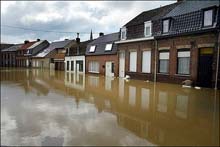Up to 500 people are estimated to have died across Hungary last week, partly due to a heatwave gripping central and southeast Europe, say Hungarian medical officials.
Record-breaking high temperatures also killed 12 Romanians, one man in Macedonia and another man on the island of Corfu, officials said, while firefighters, soldiers and volunteers battled wildfires across a tinderbox southeastern Europe.
In southern Italy, thousands of tourists were trapped on beaches in the Puglia region as a fast-moving bush fire forced people from campsites and hotels to run for their lives. At least two people have died, local authorities said.
Britain, however, was experiencing what many said was the worst summer in living memory. Emergency workers fought to hold back overflowing rivers as the worst floods in 60 years engulfed towns and villages, mainly in central England.
The worst toll appeared to come from Hungary which said the heatwave, touching 41.9 Celsius in one part part of the country may have contributed to the early deaths last week of 500 people.
Scorching temperatures across in France in 2003 led to the early deaths of 15,000 mainly elderly people.
"In this period, in the central area of Hungary ... this (heat) contributed to the premature death of 230 more people which (extrapolated) to a national level means about 500 deaths," said the National Institute of Environmental Health.
In Puglia, emergency services used patrol boats and helicopters to whisk some 4000 holidaymakers and residents to safety, media reported. Many had rushed to the beach in bathing suits, leaving all belongings behind. The fire spread quickly, threatening hotels and holiday villages, port police said. The nationalities of those involved were not immediately clear.
Scientists blamed the heavy rains in Britain on the jetstream, a fast-moving air current that is more southerly than usual this year, bringing with it stormy weather.
"Extreme events such as we have seen in recent weeks herald the spectre of climate change and it would be irresponsible to imagine that they won't become more frequent," Nick Reeves, executive director of The Chartered Institution of Water and Environmental Management, a scientific group, said.
But Alastair Borthwick, an engineering professor at Oxford University, said there was not enough data to judge whether climate change was a factor in the flooding.
Serbia battled 50 forest fires on what meteorologists predicted would be the hottest day of the year, with the temperature topping 43 degrees Celsius (109 Fahrenheit).
In Romania, the new deaths pushed the toll from the heatwave up to 30, and 19,000 people have been admitted to hospitals in the region's second devastating hot spell this year.
More than 35 people died in Romania, Turkey and Greece in June when the mercury shot up to 46 Celsius.
Forests in Bosnia, Serbia, Montenegro, Macedonia, Bulgaria and Greece have been ravaged by flames this week, blamed on record-high temperatures after the dry winter.
In Macedonia temperatures hit an all-time record of 45 degrees, and many parts of the country had no power.
In Bosnia, the town of Citluk, the Adriatic port of Neum and the mountain town of Visegrad declared states of emergency.
There were 18 fires burning in Serbia's Kosovo province, and police, forestry officials and soldiers from the resident Nato-led peacekeeping force KFOR battled flames.
In Athens, Greeks and tourists walked with umbrellas and newspapers covering their heads. Many flocked to nearby beaches.
PHOTO CAPTION
A flooded street after heavy rainfall in Poperinge, Belgium. (AFP)


 Home
Home Discover Islam
Discover Islam Quran Recitations
Quran Recitations Lectures
Lectures
 Fatwa
Fatwa Articles
Articles Fiqh
Fiqh E-Books
E-Books Boys & Girls
Boys & Girls  Articles
Articles










